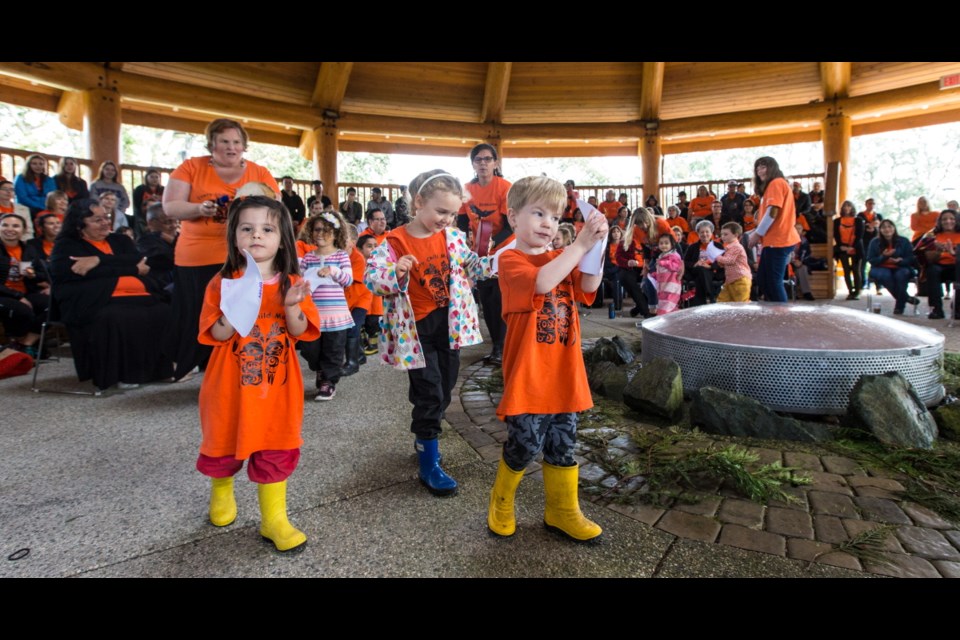 Four years ago, Phyllis Webstad was sitting in a coffee shop crying to a friend.
Four years ago, Phyllis Webstad was sitting in a coffee shop crying to a friend.
She’d been asked to speak to the media about her experiences in residential school, and she had no idea what to say. She was working with a group of survivors for the Truth and Reconciliation Commission; her peers had appointed her to be their spokesperson.
“I was so nervous, and then I thought I would just talk about my first day of school,” Webstad explained.
When she met reporters the following day, she told them about how her grandmother had purchased her a shiny orange shirt for her first day at St. Joseph’s Indian Residential School, when she was six years old, in 1973.
When she arrived at the school, she was stripped and her clothing was taken away. She never saw that shirt again.
Phyllis is from the Dog Creek First Nation, about an hour and a half from the residential school she attended near Williams Lake.
Orange Shirt Day is still a relatively new day. This is its fourth year, and each year it’s gaining traction, and orange shirts are popping up across Canada.
I have worn an orange shirt every Sept. 30 since I heard her story. My work supports this day, and our employees from across the province participate.
School districts, municipalities and organizations are all participating. By wearing orange shirts, we are acknowledging Phyllis, residential-school survivors and the children who didn’t make it home.
Survivors have told Phyllis when they see people wearing orange shirts, they feel as if they are getting a little bit of justice. Phyllis said she feels the same.
Each year, more people participate, and Phyllis credits social media with helping her spread the word.
To think Phyllis was nervous and crying over what she would talk about, and now we’ve seen the impact her story has made. Storytelling is powerful, especially if it captures a relatable moment. That’s what the orange-shirt story has done.
I’ve often heard from people who acknowledge the importance of the day, but they aren’t sure how to approach the issue with children. Sometimes, the conversation gets skipped, because of its uncomfortable nature.
When I explain residential schools to my daughter, I say there were schools where First Nations kids had to go and live at school, away from their families. Children who were not First Nations could stay home.
When I first told her this, she quickly replied: “If those schools were still here, I wouldn’t be allowed to live with you. Why did this only happen to First Nations kids?”
I don’t get into physical and sexual abuse at this point; the conversation is age-appropriate and she gets it. She thinks about someone taking her favourite shirt away, and she says she wears orange because Phyllis couldn’t.
Phyllis talks to schools and she admits she prefers speaking to high-school and college students. She is working on a children’s book explaining how Orange Shirt Day came to be.
“I’m telling the story from the perspective of a child. We don’t need to traumatize them,” she said. “I tell them I stayed at the school for 300 sleeps. For these kids, one or two nights away from home is a lot.”
To an older audience, Phyllis explains things in greater detail.
This time of year is hard for Phyllis. She knows she will be sharing her story over and over. With a crackle in her voice, she spoke to me about how she needs to prepare mentally for September and how she’ll be brought back to her old memories.
Even though it’s hard, she knows her courage is making a big difference.
“My eight-year-old grandson tells me I’m famous,” she said with a little chuckle.
Phyllis doesn’t feel famous and she has people she looks up to. It’s been her wish for a while to meet Rick Hansen. She said she has tried to get in touch with him and said she’s never been able to get through his public-relations people.
I wonder if Rick Hansen will be wearing an orange shirt on Saturday.
Phyllis will be in Victoria on Saturday at Centennial Square to share her story. The event runs from noon to 4 p.m.
Charla Huber works in communications and Indigenous relations for M’akola Group of Societies.



